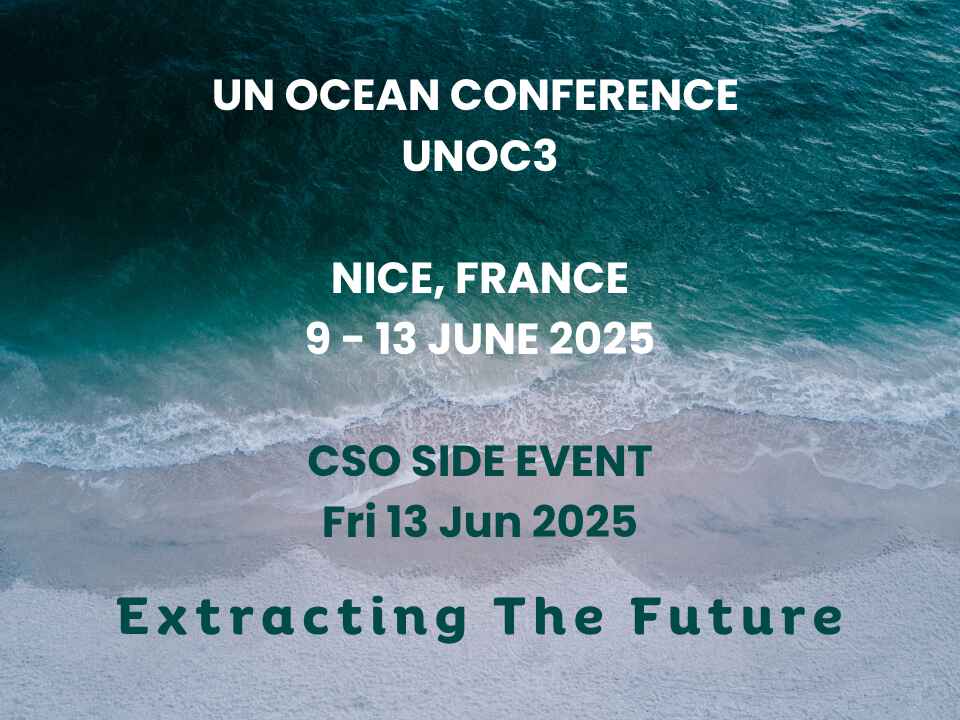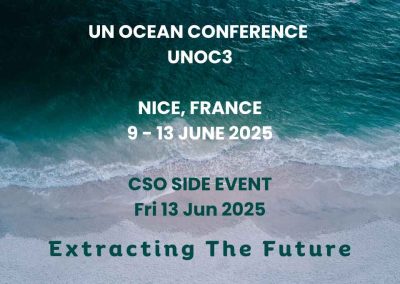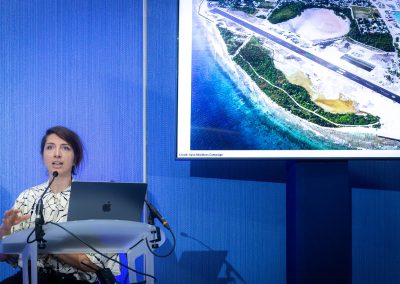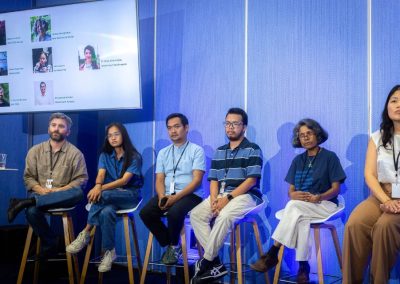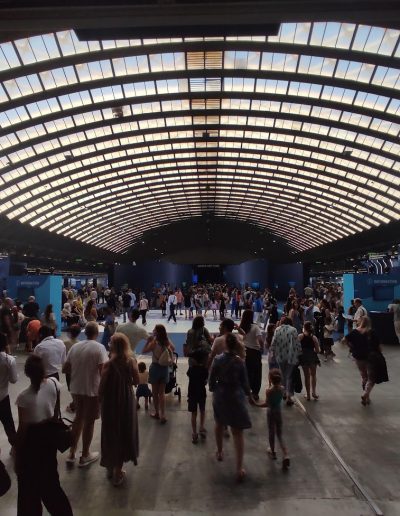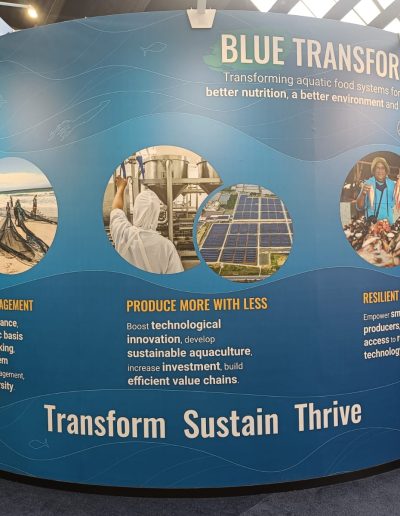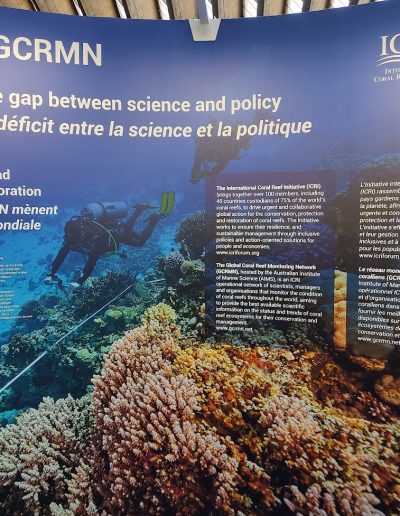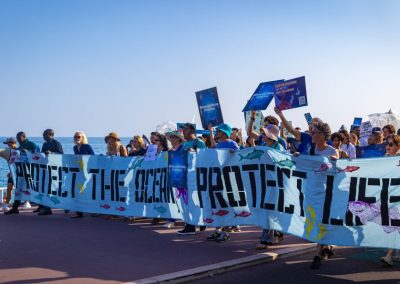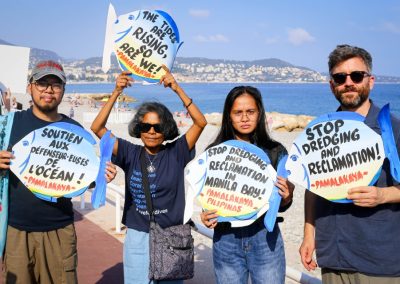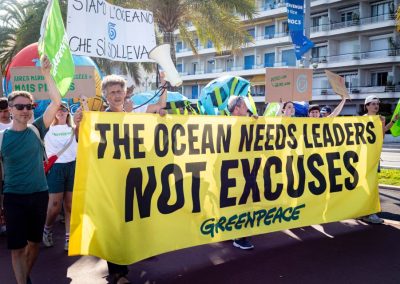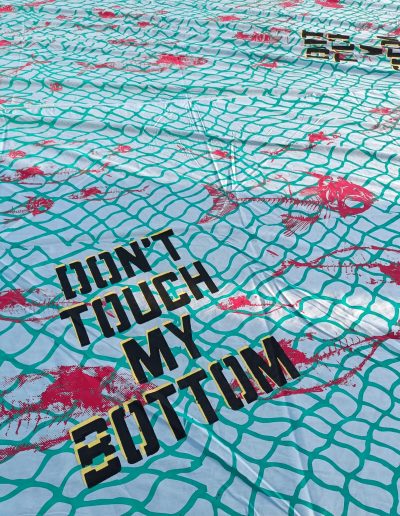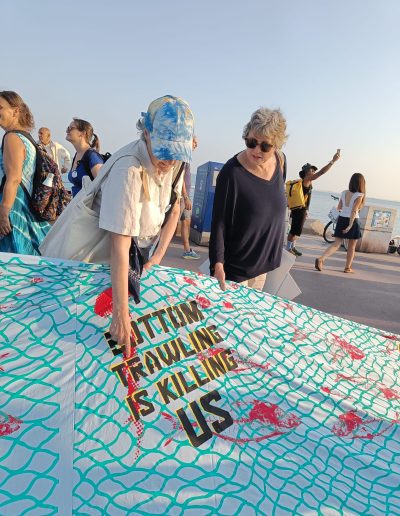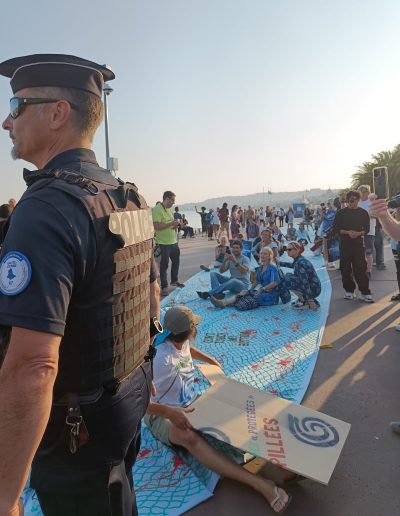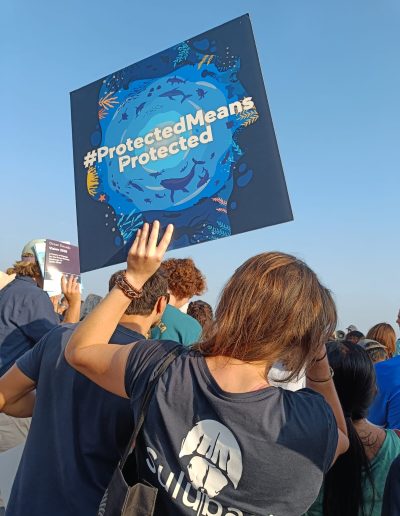UNOC3 : Extracting the future …
… with no ocean justice in sight!
by Humay Abdulghafoor, Volunteer, #SaveMaldives Campaign
Opinions expressed in this article are that of the author
The 3rd United Nations Ocean Conference (UNOC3) was held in Nice, France from 9-13 June 2025. #SaveMaldives Campaign was invited to the conference for a side-event in collaboration with partners from the Philippines and Indonesia, supported by Both Ends (Netherlands) and UNEP-GRID Geneva. The side-event was held in the Green Zone of UNOC3 named La Baleine (The Whale) on Friday 13 Jun 2025, facilitated by Both Ends.
The event was attended by a variety of interested stakeholders. Conducted as a panel discussion, the event was moderated by Dr Antje Scharenberg, Postdoctoral Research Fellow at the University of Southampton, UK. The six panellists included Dr Murtah Shannon (Senior Policy Advisor, Both Ends, Netherlands); Stephanie Chuah (Programme Officer, UNEP-GRID Geneva); Muhammed Al Amien (Executive Director, Walhi Sulawesi, Indonesia); Jonilla Castro (Spokesperson, Kalikasan People’s Network for the Environment, Philippines); Terence Repelente (Community Organiser, Pamalakaya, Philippines); and Humay Abdulghafoor (Campaign Lead, Save Maldives Campaign).
A chance encounter with the Maldives Minister for Tourism & Environment, Thoriq Ibrahim, at La Baleine offered Humay the opportunity to invite him to our side-event, although he was not in our event audience on the day! Which of course, did not come as a surprise to us!
Youth attendees to the UNOC3 who came to our side-event commented on the absence of conference events that focused on ocean justice for impacted communities. We acknowledge their comments of approval of our event, for being one that stood out in the events programme for having an authentic focus on ocean justice for people and planet.
A recording of our UNOC3 side-event is linked above, and clickable photo-galleries are below. For additional relevant resources, check out our event linktree.
Our own highlights from UNOC3 (below) point to disillusionment and dissent on many fronts.
A Corporatised Affair
UNOC3 observations suggest a corporatised affair, where the customary “Green Zone” dedicated to civil society groups at such conferences were occupied primarily by corporate interests. La Baleine was decorated with beautiful images of marine wildlife. The venue was conspicuously devoid of images depicting the dire state of our oceans and wildlife, suffocating with ocean litter and suffering the pressures of human waste on stressed ecosystems burdened with climate change. UNOC3 did not deliver for people and planet, but appeared to have been a site of greenwashing for corporates and yet another forum for UN blahblahblah.
UN environment conferences, including the critical gatherings of the UN COP (Conference of the Parties to the UNFCCC) have become hopeless and problematic over the past years for becoming superficial spaces for corporate drama. The perception of corporate domination and takeover was acutely felt about the UNOC3 by civic groups, including those supporting fishers in coastal communities globally.
UNOC3 boycott by WFFP
A statement read out at the sidelines of the conference on behalf of fisher communities boycotting the conference explains the backstory for such dissent. The following extracts are from a statement issued by the World Forum of Fisher Peoples (WFFP) who boycotted UNOC3.
“We formed WFFP to fight for the customary and human rights of the more than 10 million fisher peoples, encompassing diverse groups of traditional fishermen and fisherwomen, women and men seafood collectors and gatherers from 52 countries. The so-called development projects rolled out by corporations, financiers and governments all over the world, are increasingly expropriating our fisher peoples from our territories and denying our customary rights. …
WFFP will not participate in the third UN Ocean Conference! No organisation will represent WFFP at the UN Ocean Conference. Instead WFFP will organise a counter conference to raise our voice and advance our own solutions. …
The [UNOC’s] preparatory process involves a series of stakeholder meetings which are dominated by resource powerful actors and to which we – in practical terms – are denied access to. …
The UN Ocean Conference does not lead to any binding agreement by our governments.
The UN Ocean Conference is advancing false solutions such as ‘blue foods’ or ‘aquatic foods’, to promote policy reforms, deregulation and investments in aquaculture, which is no other than the industrial factory farming of aquatic food. …
… the 30by30 agenda is expropriating our people from our territories. While we are promised jobs and growth, our experiences are more criminalization, loss of territories, erosion of our local food systems, and violating fundamental rights to life and livelihoods.”
The sentiments of WFFP are only too close to home for communities affected by corporate resource grabbing in the Maldives!
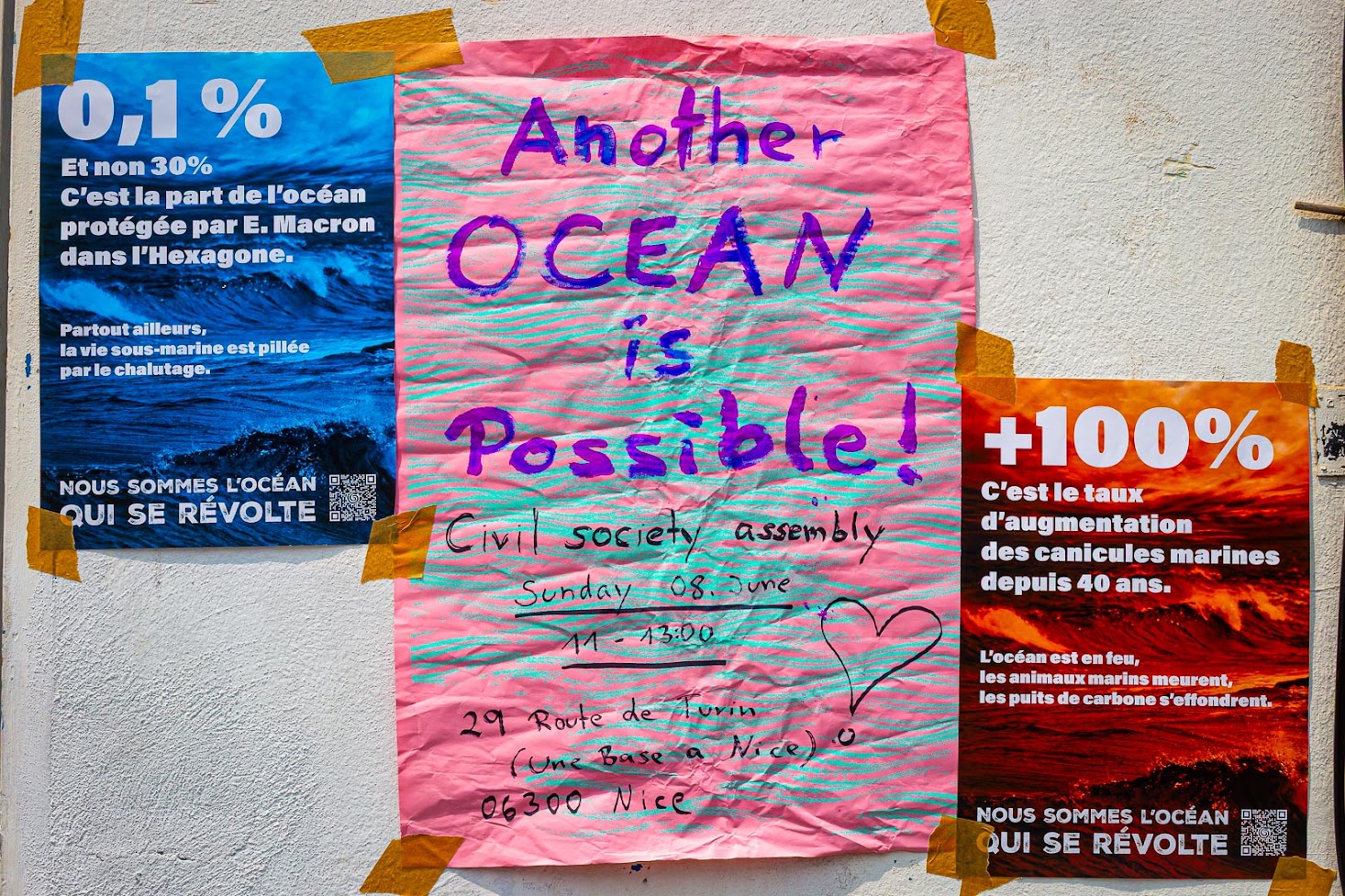
Don’t Touch My Bottom!
On 7 June, prior to the start of the UNOC3, civil society stakeholders participated in The Blue March organised by Seas-at-Risk at the seaside in Nice. Ocean protection messages abounded as advocates and ocean defenders called for ocean protection in every possible way. Some key messages at the march called on governments to stop bottom trawling in our oceans, with the slogans ‘Don’t Touch My Bottom’ and ‘Protected means protected’.
We joined partners to add our own voices to stop dredging and reclamation of our ocean home. Notably, Nice police were mobilised to disrupt the peaceful protest where advocates unfurled the world’s largest hand-printed banner to tell the world that ‘bottom trawling is killing us’! The show of force and the heavy presence of less than orderly law enforcement elements indicated the low tolerance for dissent around UNOC3. The show of unnecessary aggression by law enforcement officials gave away the position of the involved authorities that civic voices, action and participation was less than welcome at UNOC3. The evident corporate takeover of La Baleine during the conference is indicative of the absence of civic space at UNOC3 which should be about people and planet, as opposed to a space for displaying lethal weapon-bearing armed power and corporate exploitation.
‘Nice est avec toi – Gaza, Gaza’
On 9 June, the first day of UNOC3, news of the arrest and detention of the Gaza Freedom Flotilla (on Madleen) by hostile Israeli forces, with its crew of 12 including global climate ambassador Greta Thunberg and French-Palestinian member of the European parliament (MEP) Rima Hassan mobilised civic action in Nice. Despite the disproportionate power dynamics of authoritarian excess and abuse of power, the civic spirit was clear in Nice. Civil society activists and members of the public gathered to rally in solidarity with the people of Gaza and Palestine, and those risking their lives to highlight the ongoing genocide against the people of Palestine.
‘Finance is the problem, not the solution’
The Ocean Basecamp at La Baleine seemed to have a semblance of civic spirit at UNOC3, standing out as an outlier among the corporate crowd greenwashing in the UNOC3 Green Zone. Ocean defenders from around the world – people facing the real dangers of corporate encroachment and violent takeover of their ocean livelihood resources – presented their stories of courageous dissent to protect nature and livelihoods for their communities.
At this venue, our partners from the Philippines shared their traumatic stories of risks to life and the murder of community members, which highlighted the real struggles for ocean justice against corporate interests by coastal communities.
Our struggles may be geographically varied and distinct. But they are the same struggles against global corporate monopolies exploiting colonial power over politically weak states in various conditions of long-standing deprivation due to the unequal power dynamics of colonialist economic warfare globally.
Alternative thinkers about the global economy, specifically the ‘blue’ economy spoke sense at an event held at the Ocean Basecamp. Notably, academic and author of the book ‘The Blue Commons’, Prof. Guy Standing spelled out the glaring fact that “finance is the problem, not the solution” for ocean justice and an equitable future in the global economy of the ocean commons. Prof. Standing is an inspiration to those seeking to recover the ocean as a shared global public common good, and rescue it from becoming a site of conflict for extraction and exploitation by corporate profiteers.
The Blue Commons is a must read for everyone. It is especially important for anyone seeking to understand ocean justice in our broken world. It offers inspiration and insight on what global corporate greed has done to the sustainability and stability of our oceans and our potential to survive and have a liveable future.
